Festival greets summer with traditional flair
Lixia, one of the 24 Solar Terms, will herald end of spring amid rising temperatures, Zhang Lei reports.

This may be an age of weather and communication satellites, of mobile phones and online messaging, but ancient customs and traditions still have a role to play. On May 5 last year, in Banshan National Forest Park, Gongshu district, Hangzhou, Zhejiang province, a parade of dozens of people dressed in hanfu, the traditional clothing of the Han people, and holding lanterns with incense candles, presented a splendid spectacle. Stopping in front of a temple dedicated to a Song Dynasty (960-1279) maiden, they performed the ceremony to "send away the spring and welcome the summer", a custom passed down the generations, which locals in ancient times used to regard as essential in order to be blessed by the summer's generosity.
The ritual celebrates lixia, or Start of Summer, as the name suggests, one of the 24 solar terms that often falls on May 5.Spring is a kaleidoscope of colors. At the end of the season, the withered petals of cherry blossoms whirling in the wind might suggest a time of change, before summer rushes forward enthusiastically with its prominent marking-lixia, eulogizing the passion of growth. If the four seasons of the year are likened to the four stages of nature, Start of Summer is definitely a ceremony celebrating nature's youth. From this day on, nature has entered a mature, enthusiastic and unrestrained period from a tender, green and mild childhood. The temperature begins to gradually warm up, and you can feel a sense of growth in the air.
Traditionally, the 24 solar terms reflect a knowledge and understanding related to agricultural production of a bygone era. Not many traditional festivals are named after these solar terms. However, in Hangzhou, locals celebrate Start of Summer as a proper festival. It has been included in the UNESCO Representative List of Intangible Cultural Heritage of Humanity in 2016. In 2020, it was listed in the fifth batch of National Intangible Cultural Heritage.
The Banshan Lixia Festival was initiated over 10 years ago by a group of locals interested in culture headed by Ni Airen, chairman of the Gaoting Cultural Research Association in Hangzhou. It was gradually expanded into a festival with the support of the local government. A native of the Banshan subdistrict, Ni has a strong interest in folk customs. In 2007, Ni, together with other folk culture enthusiasts, held the first festival. Later, the local government helped organize cultural activities, and the festival has gradually become a cultural brand in Hangzhou.
"Integrating traditional customs into modern life and initiating a popular holiday event for the public is what I've been campaigning for," Ni says.
Chinese eat seasonally, and this is the time when people living in the Yangtze River Delta are really feasting on a smorgasbord of rice varieties. Choices include black rice, five-color rice and broad bean rice. Black rice is made by immersing brown rice in the juice of the leaves of blueberry shrubs, commonly known as "black tree" by the locals. Tradition has it that eating black rice on lixia can enhance one's immune system, prevent heat stroke, weight loss and mosquito bites in summer. Five-color rice is cooked with red, black, green and mung beans, as well as soybeans, and mixed with white rice.
Examining the local chronicles from the Ming Dynasty (1368-1644) in the eastern region of Zhejiang province reveals tidbits of the customs that now constitute the main body of the later Lixia Festival.
Deqing county chronicled the custom of weighing children on lixia when families go for an outing. In modern days, a large scale more than 1 meter long is hung on a small rattan chair, allowing the child in the chair to be weighed safely. Lixia weighing is meant to remind people to keep fit and avoid weight loss in summer, unlike nowadays when so many feel the need to lose weight. Locals believe that after this weighing ceremony, children can survive and thrive in the summer heat.
A more interesting food custom on lixia is the way children eat and play with eggs. Parents put boiled eggs into small mesh bags, and hang them on their children's chests. Egg fighting starts when a child goes to meet their pals, each holding one egg, and colliding until one side breaks the shell. The last winner is the "Egg King", and the broken eggs will be eaten by the competitors.
Xia Yanming, 43, who now resides in Beijing, originates from Taizhou, Zhejiang. He recalls days during his childhood when his parents kept "forcing" him to eat duck eggs on Start of Summer. The memory remains sharply focused to this day, with the consequence that he is not particularly fond of any meal or recipe containing eggs. Xia, however, admits that this custom has helped family bonding.
"Back in the era of food scarcity, I was told by my parents that duck eggs could cool the fire in the spleen, and enhance my bone and muscles. On lixia, fresh duck eggs were cooked, and I was ordered to eat at least three. And my mother always picked out the most turquoise ones from a big basket for me. It is said the turquoise ones have the best nutrition," Xia says.
"I remember that I didn't like to eat egg yolks. However, my parents said that if I didn't eat the yolk, the bones of my feet would be weak, and I wouldn't be able to walk quickly. Fortunately, I listened, otherwise I might have lost the ability to jog, a routine that I love."
On the day, families in Taizhou begin cooking the summer eggs. They are usually boiled with tea leaves or walnut shells. By the time the eggshells start to slowly turn red, the delicious smell wafts up from the kitchen and fills the whole house. Tea eggs should be eaten while they are still hot. The flavor can be strengthened by the addition of some good Shaoxing rice wine, from Zhejiang's Shaoxing, and a sprinkle of fine salt.
"On days around lixia, people eat and travel with a clear theme, that is, summer and health," says Yang Xiu, a researcher at the Institute of Anthropology of Arts, which is part of the Chinese National Academy of Arts. "Similar solar terms include Start of Winter, when the yin is strong. People also seek the healthy options, but at that time they go for fish and meat to warm up the body. This is the precious wisdom accumulated by the ancients. People today may avail of greenhouse technology to break the rhythm of traditional society. But they still have to follow nature."
Lixia also has a romantic and poetic name-"drunken summer"-in Taizhou. The region has a tradition of home-brewing rice wine that stretches back centuries. Sweet rice wine is best served warm on lixia with a beaten egg and a sprinkle of sweet-scented osmanthus.
The beauty of lixia has also been extolled by many literati, with the literature and poems passed down now viewed as masterpieces. Lu You, a Song Dynasty poet, wrote: "The red flags are erected all over the city to greet the Sun God who is ready to drive back to his throne; the mud is fresh, the swallows are rejoicing in the nest; the flowers are exhausted, and the bees are sparser; the shade of the locust and willow trees is thickening; summer heat is yet to climb up the curtains and windows; the sun slants west, and after a relaxing bath, I skillfully try on summer clothes."
Back in Banshan, Hangzhou, on lixia last year, along the way to the maiden's temple, the gongs and drums were clamorous, the flags were flying high, the curving hill road scalloped the edge of the light blue sky, the onlookers transformed into a crowd, and the worshippers blessed them with happiness and well-being.
Today in Banshan, the Ni family and its clansmen believe the Lixia Festival held by the temple is the right way to enhance cohesion in their community. The power of the solar terms and folk customs are blended together, Ni insists.
Adjustment and innovation are introduced. These include a temple fair that incorporates an intangible cultural heritage market and handicraft trading. Activities, such as running events on the mountain, are held to underline the solar term's principal purpose of striving for a healthy physique.
"Establishing such a festival and attracting wider public attention can help people become interested in these various, unfamiliar festival symbols and learn more about lixia," says Li Yiming, a PhD of history studies at Shandong University.
Debates on how to protect, revitalize and introduce traditional festivals have never ended, but Li believes it is the cultural memories behind these customs and beliefs that matter the most.
"The Lixia Festival might be viewed by many as a mere performance. However, through the symbols of such festivals, we can still inherit the cultural memory of the farming era that has gone before. We know how and why our ancestors lived on this land at such a time. That's good enough, isn't it?" he asks.
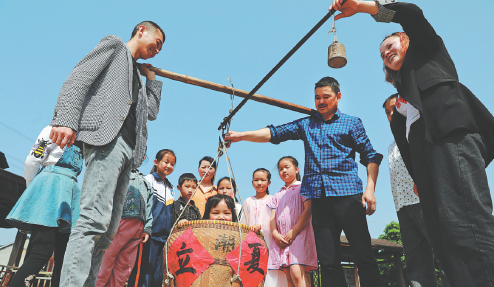
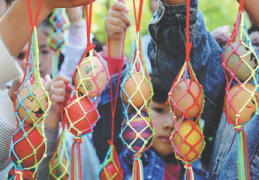
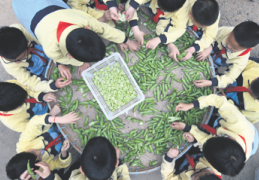
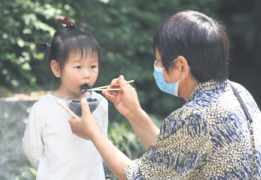
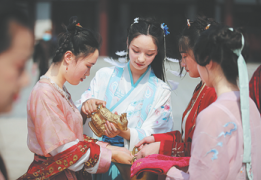


Today's Top News
- China, US gear up for pivotal trade talks
- Nation boosts global AI governance
- Policy support helps stabilize industrial profit
- China's industrial profits down 1.8% in H1
- Thailand responds to Trump's ceasefire call
- Recall vote shows DPP's manipulation runs against Taiwan people's will: mainland spokesperson






























